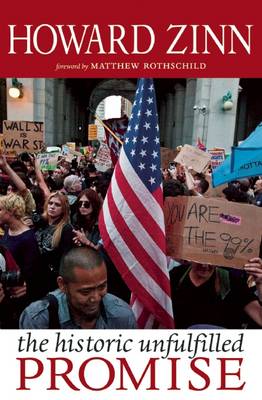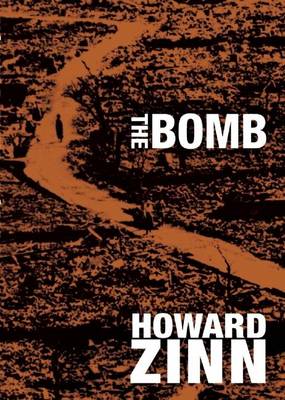City Lights Open Media
2 total works
Howard Zinn's views on social movements, freedom, history, democracy, and our own human potential are educational and transformative. In few places is his voice more clear and accessible than in the dozens of articles he penned for The Progressive magazine from 1980 to 2009, offered together here in book form for the first time. Whether encouraging people to organize, critiquing the government, or speaking on behalf of working people who struggle to survive in an economy rigged to benefit the rich and powerful, Zinn's historical clarity, unflappable optimism, and unshakable questions reverberate throughout The Historic Unfulfilled Promise: "Have our political leaders gone mad?" "What kind of country do we want to live in?" "Has the will of the people been followed?" The Historic Unfulfilled Promise is a genuine work of conscience, rich in ideas, charged with energy; an invaluable introduction for the uninitiated and a must-have for Zinn's fans. "Passionate, iconoclastic, and wrly humorous ...[Zinn] sometimes proves astounding in his almost clairvoyant analysis."
--Publisher's Weekly Starred Review "A sharp and insightful collection from one of the country's most visible historians and critics."--Booklist "A useful introduction to one of America's great scholar-activists."--Kirkus Reviews "Howard Zinn's life and work are an unforgettable model, sure to leave a permanent stamp on how history is understood and how a decent and honorable life should be lived."--Noam Chomsky "Proudly, unabashedly radical ...Mr. Zinn delighted in debating ideological foes, not the least his own college president, and in lancing what he considered platitudes, not the least that American history was a heroic march toward democracy."--New York Times "For Howard, democracy was one big public fight and everyone should plunge into it. That's the only way, he said, for everyday folks to get justic--by fighting for it."--Bill Moyers
--Publisher's Weekly Starred Review "A sharp and insightful collection from one of the country's most visible historians and critics."--Booklist "A useful introduction to one of America's great scholar-activists."--Kirkus Reviews "Howard Zinn's life and work are an unforgettable model, sure to leave a permanent stamp on how history is understood and how a decent and honorable life should be lived."--Noam Chomsky "Proudly, unabashedly radical ...Mr. Zinn delighted in debating ideological foes, not the least his own college president, and in lancing what he considered platitudes, not the least that American history was a heroic march toward democracy."--New York Times "For Howard, democracy was one big public fight and everyone should plunge into it. That's the only way, he said, for everyday folks to get justic--by fighting for it."--Bill Moyers
As a World War II combat soldier, Howard Zinn took part in the aerial bombing of Royan, France. Two decades later, he was invited to visit Hiroshima and meet survivors of the atomic attack. In this short and powerful book, Zinn offers his deep personal reflections and political analysis of these events, their consequences, and the profound influence they had in transforming him from an order-taking combat soldier to one of our greatest anti-authoritarian, antiwar historians. This book was finalized just prior to Zinn's passing in January 2010, and is published on the sixty-fifth anniversary of the bombing of Hiroshima. Simultaneous publication this August in the U.S. and Japan commemorates the 65th anniversary of the USA's two atomic bombings of Japan by calling for the abolition of all nuclear weapons and an end to war as an acceptable solution to human conflict. "Zinn writes with an enthusiasm rarely encountered in the leaden prose of academic history..."--New York Times Book Review "This collection of essays is a great book for anybody who wants to be better informed about history, regardless of their political point of view."
--O, The Oprah Magazine "Zinn collects here almost three dozen brief, passionate essays...Readers seeking to break out of their ideological comfort zones will find much to ponder here."--Publishers Weekly "A bomb is highly impersonal. The dropper can kill hundreds, and never see any of them. The Bomb is the memoir of Howard Zinn, a bomber in World War II who dropped bombs along the French countryside while campaigning against Germany. After learning of Hiroshima and Nagasaki, Zinn now speaks out against the use of bombs and what it can do to warfare. Thoughtful and full of stories of an old soldier who regrets what he has done, The Bomb is a fine posthumous release that shares much of the lost wisdom of World War II."--James A. Cox, The Midwest Book Review "Throughout his academic career, his popular writings and work as an activist Zinn consistently, and often successfully, threw a wrench in the works of the US war machine. He may be gone, but through his powerful and passionate body of work--of which The Bomb is an excellent introduction--thousands of others will be educated and inspired to work for a more humane and peaceful world."
--Ian Sinclair, Morning Star "The path that Howard Zinn walked--from bombardier to activist--gives hope that each of us can move from clinical detachment to ardent commitment, from violence to nonviolence."--Frida Berrigan, WIN Magazine Howard Zinn (1922 --2010) was raised in a working-class family in Brooklyn, and flew bombing missions for the United States in World War II, an experience he now points to in shaping his opposition to war. Under the GI Bill he went to college and received his Ph.D. from Columbia University. In 1956, he became a professor at Spelman College in Atlanta, a school for black women, where he soon became involved in the civil rights movement, which he participated in as an adviser to the Student Nonviolent Coordinating Committee (SNCC) and chronicled, in his book SNCC: The New Abolitionists. Zinn collaborated with historian Staughton Lynd and mentored a young student named Alice Walker. When he was fired in 1963 for insubordination related to his protest work, he moved to Boston University, where he became a leading critic of the Vietnam War. In his liftetime, Zinn received the Thomas Merton Award, the Eugene V.
Debs Award, the Upton Sinclair Award, and the Lannan Literary Award. He is perhaps best known for A People's History of the United States. CityLights Booksellers and Publishers previously published his essay collection A Power Governments Cannot Suppress.
--O, The Oprah Magazine "Zinn collects here almost three dozen brief, passionate essays...Readers seeking to break out of their ideological comfort zones will find much to ponder here."--Publishers Weekly "A bomb is highly impersonal. The dropper can kill hundreds, and never see any of them. The Bomb is the memoir of Howard Zinn, a bomber in World War II who dropped bombs along the French countryside while campaigning against Germany. After learning of Hiroshima and Nagasaki, Zinn now speaks out against the use of bombs and what it can do to warfare. Thoughtful and full of stories of an old soldier who regrets what he has done, The Bomb is a fine posthumous release that shares much of the lost wisdom of World War II."--James A. Cox, The Midwest Book Review "Throughout his academic career, his popular writings and work as an activist Zinn consistently, and often successfully, threw a wrench in the works of the US war machine. He may be gone, but through his powerful and passionate body of work--of which The Bomb is an excellent introduction--thousands of others will be educated and inspired to work for a more humane and peaceful world."
--Ian Sinclair, Morning Star "The path that Howard Zinn walked--from bombardier to activist--gives hope that each of us can move from clinical detachment to ardent commitment, from violence to nonviolence."--Frida Berrigan, WIN Magazine Howard Zinn (1922 --2010) was raised in a working-class family in Brooklyn, and flew bombing missions for the United States in World War II, an experience he now points to in shaping his opposition to war. Under the GI Bill he went to college and received his Ph.D. from Columbia University. In 1956, he became a professor at Spelman College in Atlanta, a school for black women, where he soon became involved in the civil rights movement, which he participated in as an adviser to the Student Nonviolent Coordinating Committee (SNCC) and chronicled, in his book SNCC: The New Abolitionists. Zinn collaborated with historian Staughton Lynd and mentored a young student named Alice Walker. When he was fired in 1963 for insubordination related to his protest work, he moved to Boston University, where he became a leading critic of the Vietnam War. In his liftetime, Zinn received the Thomas Merton Award, the Eugene V.
Debs Award, the Upton Sinclair Award, and the Lannan Literary Award. He is perhaps best known for A People's History of the United States. CityLights Booksellers and Publishers previously published his essay collection A Power Governments Cannot Suppress.

